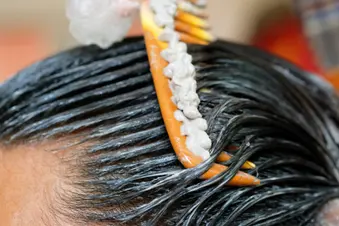
You have many safe, effective options for treating hair loss.
But not all treatments are on the up-and-up. Many companies claim to have effective products and treatments that regrow your hair when there’s little or no science to back it up. Some may even be harmful to your hair.
Here’s how to avoid scams and choose a treatment that really works.
Tips to Avoid Scams
Avoid products with big promises. Read the claims. Do you see words like “amazing,” “fast,” “immediate,” “instant,” or “quick?” If so, it’s a red flag. Regrowing hair is a slow, gradual process that takes time.
Be aware of false medical claims. Watch out for products that mention false facts or pseudo-science. An example is if it mentions that hair loss is caused by things like diet or stress. This is unproven. Another word to watch for is “natural.” Companies may use medical-sounding language or phrases like “natural remedy” to entice you.
Watch for big marketing budgets. Scams often come in the form of aggressive marketing campaigns from late-night infomercials, multi-level marketing companies, and radio ads. If you see a hair loss solution with a heavy marketing campaign, it may be a red flag. Many products with big-budget advertising aren’t scientifically backed treatments.
Be wary of phony reviews, testimonials, and guarantees. This is a common trick companies use to deceive you into buying a product. Remember, even with treatments backed by science, there’s no single hair regrowth treatment that works all the time.
Run it by your doctor. If you’re not sure if a product is a scam or a real treatment, ask your doctor. Better to let an expert look over the product and its claims than try to decide yourself. They’ll know why you have hair loss and which products are most likely to work for you.
Avoid These Common Scams
Herbal supplements. Many companies tout hair growth results from herbal supplements. It’s true that certain supplements can help make your hair stronger. But they can’t grow your hair back.
Snake oil. Some people advertise snake oil as a solution for hair loss. This isn’t actually oil from a snake. It’s likely a moisturizer, or a combination of moisturizers, which is oil-based.
Hair loss brushes. The idea that brushing your hair stimulates your scalp to regrow hair is just a myth. You can brush until the cows come home, but it won’t grow new hair.
Think Twice About These Products
Some products aren’t flat-out hoaxes, but the science behind them is limited. It’s unlikely you’ll see hair regrowth after using them.
Biotin. This vitamin has nutrients that are good for your hair and nails. But whether or not biotin supplements regrow hair is unclear. There isn’t strong evidence to support the idea that it helps restore your hair. If you have a biotin deficiency, it may help. But if you don’t, it probably won’t help.
Laser kits. You may see ads for an at-home laser light kit that uses LED and laser lights to trigger hair growth on your scalp. It may be a cap, comb, or headband. While light therapy may work, an at-home version probably isn’t strong enough to have real results. It may work if you combine it with other treatments, but you’ll probably have better results if you see your dermatologist for medical-level laser or light therapy.
Minoxidil(Rogaine). This is a cream or foam you apply to your scalp every day. It helps stimulate hair follicles so there are more hairs in the growth phase of the hair cycle. While this topical treatment has been shown to be effective for many people, it doesn’t work for everyone. And if you have serious hair loss, it probably won’t be very effective.
How to Find a Treatment That Really Works
Many treatments have been proven to work.
For example, corticosteroids have been shown to help hair grow again. You can take them as a pill, ointment, or injection. Some people have seen improvements from monthly injections of platelet-rich plasma injections. If you have more severe hair loss, you can try topical immunotherapy or combine several treatments.
You can also consider hair restoration surgery, like follicular unit transplants (FUT), follicular unit extraction (FUE), follicular unit strip surgery (FUSS), and other laser treatments.
Keep in mind not every treatment works for everyone. Even legitimate treatments that are backed by science don’t work 100% of the time.
You may need to try a variety of treatments before you find one that works for you. Just be sure to keep your eyes open, know your facts, and when in doubt, talk to your doctor.
Show Sources
Photo Credit: Suwit Nimjitt / EyeEm / Getty Images
SOURCES:
The Dermatology Group: “Hair Loss Products: How to Spot a Scam.”
Dermatology & Mohs Surgery Institute: “Beware of Hair Loss Product and Treatment Scams.”
North Pacific Dermatology: “Hair Loss Treatments - Don't Waste Your Money on a Scam.”
Tempus Hair Restoration of Florida: “Hair Restoration Scams: Beware of 21st Century Snake Oil.”
Vanguard Dermatology: “Spot a Scam: Empty Hair Loss Product Promises.”